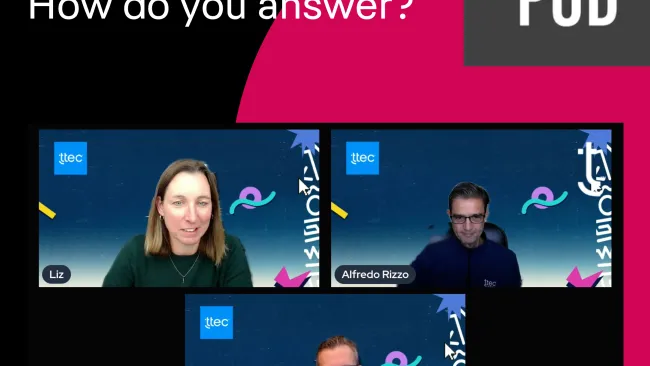In the contact center industry, it is commonly known that soft skills are critical to building trust and connection with consumers. One of the most important pillars of these skills is empathy.
And for good reason.
How better to serve the needs of people than to put ourselves in their position? What could be more important to the customer experience (CX) than a compassionate understanding of their feelings?
For healthcare, the stakes are particularly high because a positive experience most definitely leads to better health outcomes. Progressive organizations recognize this and are exploring artificial intelligence to identify opportunities to improve the customer journey every step of the way.
Words matter
In the modern world of AI-enabled speech analytics and natural language understanding (NLU), there are algorithms that measure the overall “feeling” of an interaction. These algorithms recognize who is the associate and who is the caller, and examine behaviors like crosstalk and silence, interpreting word choices and vocal tones on each side of the conversation to calculate a sentiment score.
It should come as no surprise that in contact center analyses, the words and phrases associated with empathy provide a lift to the consumer sentiment, proving — as one might expect — that a call with expressed empathy earns a higher sentiment rating than a call lacking empathy.
Empathy is meaningful and has an important bearing on human connection and yet frequently used empathetic phrases have less impact on the overall sentiment of a call than you might expect.
That’s because empathy is an internal function rooted in feelings and thoughts, distinct from the spoken word.
When we train and coach empathy, we ask our contact center advocates to imagine how the caller feels or to think about the caller’s situation. In healthcare, a caller may have just received a serious medical diagnosis, which triggers not only emotional distress, but financial worries too. And while we know that empathy is not sympathy, we often respond with sympathetic language: “I’m sorry to hear that” and “I understand that’s difficult” and “I can hear how frustrating this must be.”
Although these are reassuring statements, they serve to accentuate the negative, what went wrong, what failed.
5 ways to accentuate the positive
The real game changer of CX is positive language. Words and expressions charged with encouragement and optimism have twice the impact of empathetic words. Twice. Empathy gives a sentiment bump, sure, yet positive language more than doubles it.
TTEC’s NLU algorithm listens for phrases and words like, “I’m so glad you’ve called,” “you’re in good hands” and “it’s my pleasure.” Affirmative language, such as “certainly,” “definitely,” and “I can absolutely assist you” are kind and uplifting words to hear. Did you want to know how an interaction feels? How about, “wonderful,” “fantastic,” “delightful!”
Is it critical to acknowledge understanding of the caller’s experience? It’s table stakes. Are you ready to transform your caller’s experience? It’s time to accentuate the positive.
- Encourage CX mindset: Create a positive mindset for ourselves and the patients we assist. When we employ positive language, we are more likely to approach situations with a can-do attitude, which can lead to greater compliance with medical advice, success, and resilience.
- Enhance relationships: Foster better communication by creating a friendly and supportive atmosphere. Convey empathy, respect, and understanding in a way that leads to improved collaboration and cooperation.
- Increase productivity: By adopting positive language, we uplift and energize patients and ourselves. This can lead to increased productivity, engagement, and a higher quality of work.
- Reduce conflict and misunderstanding: Negative language can often lead to misunderstandings, defensiveness, and conflict. On the other hand, positive language promotes clarity, openness, and receptiveness. Minimize the chances of miscommunication and create a more harmonious environment.
- Influence others' perceptions: Create a favorable impression conveying professionalism, optimism, and a solution-oriented approach. This can influence the caller to see challenges as opportunities and create a positive perception of the brand.
The words we choose are the most essential element in shaping not just perceptions, but also behaviors.
Empathy leads to exponentially better CX
Humans are neurologically responsive to positive words and our brains will quite literally react with a desire to perpetuate that improved feeling. Both consumers and contact center associates will be positively influenced toward their next interaction. By coaching positive language expectations, you enable positive experience exponentially.
Tuning our NLUs and AI algorithms to seek out and capture the words that resonate with our consumers will allow for seamless transitions in our omnichannel world. It is, after all, through human interactions that we create these memorable moments for our technology to identify. Insights can then be applied to digital channel design to better reflect the truly spontaneous and personalized experiences that will always be a uniquely human capability.
When reflecting on the power of empathy to transform the consumer experience, consider that its true purpose is our “Why.”
Positive language is our “How.”














